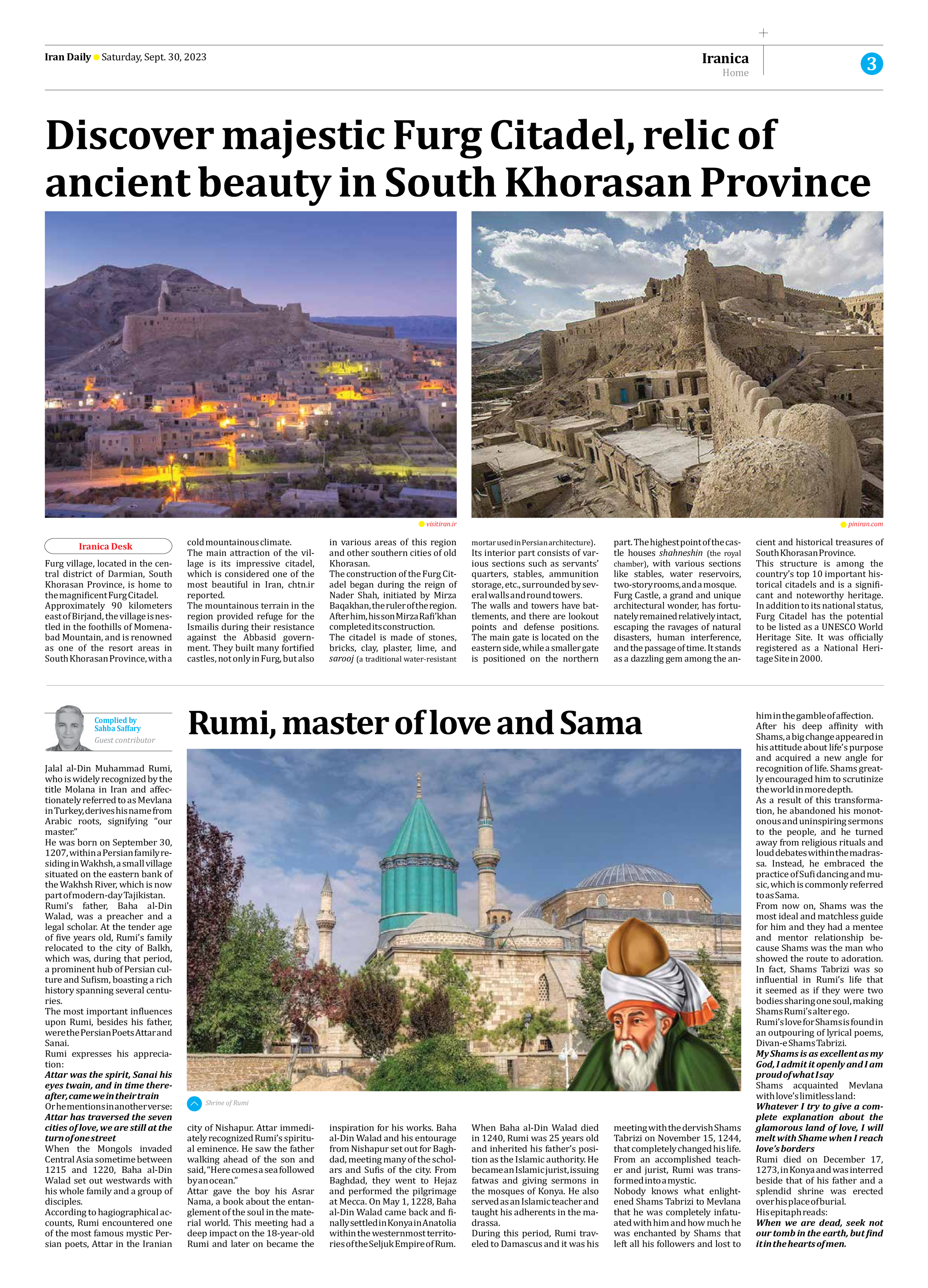
Rumi, master of love and Sama
Complied by Sahba Saffary
Guest contributor
Jalal al-Din Muhammad Rumi, who is widely recognized by the title Molana in Iran and affectionately referred to as Mevlana in Turkey, derives his name from Arabic roots, signifying “our master.”
He was born on September 30, 1207, within a Persian family residing in Wakhsh, a small village situated on the eastern bank of the Wakhsh River, which is now part of modern-day Tajikistan.
Rumi’s father, Baha al-Din Walad, was a preacher and a legal scholar. At the tender age of five years old, Rumi’s family relocated to the city of Balkh, which was, during that period, a prominent hub of Persian culture and Sufism, boasting a rich history spanning several centuries.
The most important influences upon Rumi, besides his father, were the Persian Poets Attar and Sanai.
Rumi expresses his appreciation:
Attar was the spirit, Sanai his eyes twain, and in time thereafter, came we in their train
Or he mentions in another verse:
Attar has traversed the seven cities of love, we are still at the turn of one street
When the Mongols invaded Central Asia sometime between 1215 and 1220, Baha al-Din Walad set out westwards with his whole family and a group of disciples.
According to hagiographical accounts, Rumi encountered one of the most famous mystic Persian poets, Attar in the Iranian city of Nishapur. Attar immediately recognized Rumi’s spiritual eminence. He saw the father walking ahead of the son and said, “Here comes a sea followed by an ocean.”
Attar gave the boy his Asrar Nama, a book about the entanglement of the soul in the material world. This meeting had a deep impact on the 18-year-old Rumi and later on became the inspiration for his works. Baha al-Din Walad and his entourage from Nishapur set out for Baghdad, meeting many of the scholars and Sufis of the city. From Baghdad, they went to Hejaz and performed the pilgrimage at Mecca. On May 1, 1228, Baha al-Din Walad came back and finally settled in Konya in Anatolia within the westernmost territories of the Seljuk Empire of Rum.
When Baha al-Din Walad died in 1240, Rumi was 25 years old and inherited his father’s position as the Islamic authority. He became an Islamic jurist, issuing fatwas and giving sermons in the mosques of Konya. He also served as an Islamic teacher and taught his adherents in the madrassa.
During this period, Rumi traveled to Damascus and it was his meeting with the dervish Shams Tabrizi on November 15, 1244, that completely changed his life. From an accomplished teacher and jurist, Rumi was transformed into a mystic.
Nobody knows what enlightened Shams Tabrizi to Mevlana that he was completely infatuated with him and how much he was enchanted by Shams that left all his followers and lost to him in the gamble of affection.
After his deep affinity with Shams, a big change appeared in his attitude about life’s purpose and acquired a new angle for recognition of life. Shams greatly encouraged him to scrutinize the world in more depth.
As a result of this transformation, he abandoned his monotonous and uninspiring sermons to the people, and he turned away from religious rituals and loud debates within the madrassa. Instead, he embraced the practice of Sufi dancing and music, which is commonly referred to as Sama.
From now on, Shams was the most ideal and matchless guide for him and they had a mentee and mentor relationship because Shams was the man who showed the route to adoration. In fact, Shams Tabrizi was so influential in Rumi’s life that it seemed as if they were two bodies sharing one soul, making Shams Rumi’s alter ego.
Rumi’s love for Shams is found in an outpouring of lyrical poems, Divan-e Shams Tabrizi.
My Shams is as excellent as my God, I admit it openly and I am proud of what I say
Shams acquainted Mevlana with love’s limitless land:
Whatever I try to give a complete explanation about the glamorous land of love, I will melt with Shame when I reach love’s borders
Rumi died on December 17, 1273, in Konya and was interred beside that of his father and a splendid shrine was erected over his place of burial.
His epitaph reads:
When we are dead, seek not our tomb in the earth, but find it in the hearts of men.







